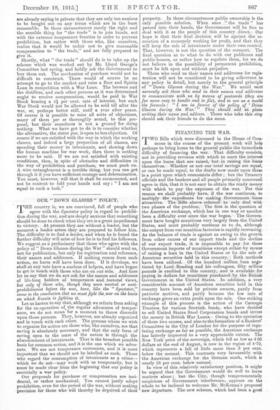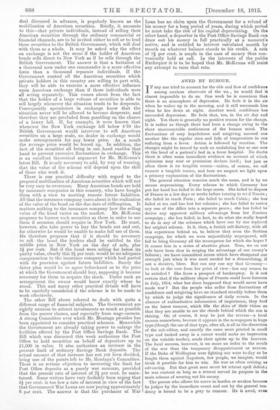FINANCING THE WAR. T WO Bills which were discussed in the
House of Com- mons in the course of the present week will help perhaps to bring home to the general public the immediate difficulty of financing the war. That difficulty consists, not in providing revenue with which to meet the interest upon the loans that are raised,: but in raising the loans themselves. Whether or not our 'total savings are equal, or can be made equal, to the drafts now made upon them is a point upon which economists differ ; but the Treasury officials and the ,bankers and all people primarily concerned agree in this, that it is not easy to obtain the ready money with which to pay the expenses of the war. For this reason we shall probably have, if the war continues, be multiply the expedients for making Government loans attractive. The Bills above referred to only deal with two phases of the problem. The first is the question of the American exchange, which has in one way or another been a difficulty ever since the war began. The Govern- ment have bought munitions very largely from the United States, and must probably continue so to do, although the output from our munition factories is rapidly increasieg. As the balance of trade is against us owing to the growth from other causes of our import trade and the decline of our export trade, it is impossible to pay for these Government imports of munitions except either by means of raising a loan in the United States or by the sale of American securities held in this country. Both methods have been utilized. Of the hundred million , loan nego- tiated by Lord Reading and his colleagues, fifty million pounds is credited to this country, and is available for paying in dollars for munitions purchased by the British Government in the United States. In addition, a very considerable amount of American securities held in this country have been sold by private owners, partly from patriotic motives, and partly because the low rate of exchange gives an extra profit upon the sale. One striking example of this process is the action of the Carnegie Trustees for various Scottish, funds, who have decided to sell United States Steel Corporation bonds and invest the money in British War Loans. Owing to the operation of these two causes and aIso.to the formation of a Bankers'Committee in the causes; of London for the purpose of regu- lating exchange as far as possible, the American exchange has latterly improved to a very appreciable extent. The New York price of the sovereign, which fell as low as 4.5g dollars at the end of August, is now in the region of 410, which represents a fall, of little more than 3 per cent. below the normal. This contrasts very favourably with the American exchange for the German mark, which is nearly 18 per cent. below normal. In view of this relatively satisfactory position, it might be argued that the Government would do well to leave matters alone ; but the City, though temperamentally suspicious of Government interference, appears on the whole to be inclined to welcome Mr. McKenna's proposed new departure. The new scheme, which had been a good deal discussed in advance, is popularly known as the mobilization of American securities. Briefly, it amounts to this—that private individuals, instead of selling. their American securities through the ordinary commercial or financial channels, are to be invited either to sell or to lend these securities to the British Government, which will deal with them as a whole. It may be asked why the effect on exchange is not the same if the holder of American bonds sells direct to Now York as if he sells through the British Government. The answer is that a battalion of a thousand men under one commander is a more effective force than a thousand separate individuals. If the Government control all the American securities which private holders in this country are willing to part with, they will be able to exercise a more effective influence upon American exchange than if these individuals were all acting separately. This comes about from the fact that the holder of a large volume of securities is able to sell largely whenever the situation tends to be desperate. Consequently speculators in exchange know that the • situation never will be allowed to become desperate, and therefore they are precluded from gambling on the chance of a heavy fall. If, for example, it were known that whenever the New York exchange fell below 4.70 the British Government would intervene to sell American securities on a large scale, no dealer in exchange would make arrangements for any lower price. As a result the average price would be forced up. In addition, the fact of the securities all being in one hand enables that hand to prevent excessive fluctuations in exchange. This is an excellent theoretical argument for Mr. McKenna's latest Bill. It is only necessary to add, by way of warning, that the value of the scheme will depend upon the skill of those who work it.
There is one practical difficulty with regard to the proposed mobilization of American securities which will not be very easy to overcome. Many American bonds are held by insurance companies in this country, who have bought them with a view to meeting remote future liabilities. All that the insurance company cares about is the realization of the value of the bond on the duo date of ird'amption. It matters nothing to the insurance company how the selling value of the bond varies on the market. Mr. McKenna proposes to borrow such securities as these in order to use them if occasion should require in New York. He must, however, also take power to buy the bonds out and out, for otherwise he would be unable to make full use of them. He therefore proposes that if it should be necessary to sell the bond the lenders shall be entitled to the middle price in New York on the day of sale, plus 21- per cent. But if the bond were selling far below its parity value, clearly this 2i per cent. would be no adequate compensation to the insurance company which had parted with its provision against future liabilities. Surely the fairer plan would be to agree beforehand as to the price at which the Government should buy, supposing it became necessary for them to acquire the stock. Under such an arrangement the owner would know exactly where he stood. This and many other practical details will have to be carefully considered if the scheme is to be made to work effectively. The other Bill above referred to deals with quite a different range of financial subjects. The Government are rightly anxious to attract investments as much as possible from the poorer classes, and especially from wage-earners. A strong Committee over which Mr. Montagu presides has been appointed to consider practical schemes. Meanwhile the Government are already taking power to enlarge the facilities offered by the Post Office Savings Bank. The Bill which was discussed this week authorizes the Post Office to hold securities on behalf of depositors up to ,000 in value. It also authorizes an increase in the present limit of ordinary Savings Bank deposits. The actual amount of that increase has not yet been decided, being one of the points left to Mr. Montagu's Committee. There is no serious objection to increasing the limit for Post Office deposits as a purely war measure, provided that the present rate of interest of 2; per cent. be main- tained. Some writers have very foolishly been urging that 2i per cent. is too low a rate of interest in view of the fact that Government War Loans are now paying approximately 5 per cent. The answer is that the purchaser of War Loan has no claim upon the Government for a refund of his money for a long period of years, during which period he must take the risk of his capital depreciating. On the other hand, a depositor in the Post Office Savings Bank can draw out his money in full practically at a moment's notice, and is entitled to interest calculated month by month on whatever balance stands to his credit. A rate of per cent. is ample in • the case of money thus con- veniently held at call. In the interests of the public, Exchequer it is to be hoped that Mr. McKenna will resist any attempt to raise that rate.











































 Previous page
Previous page